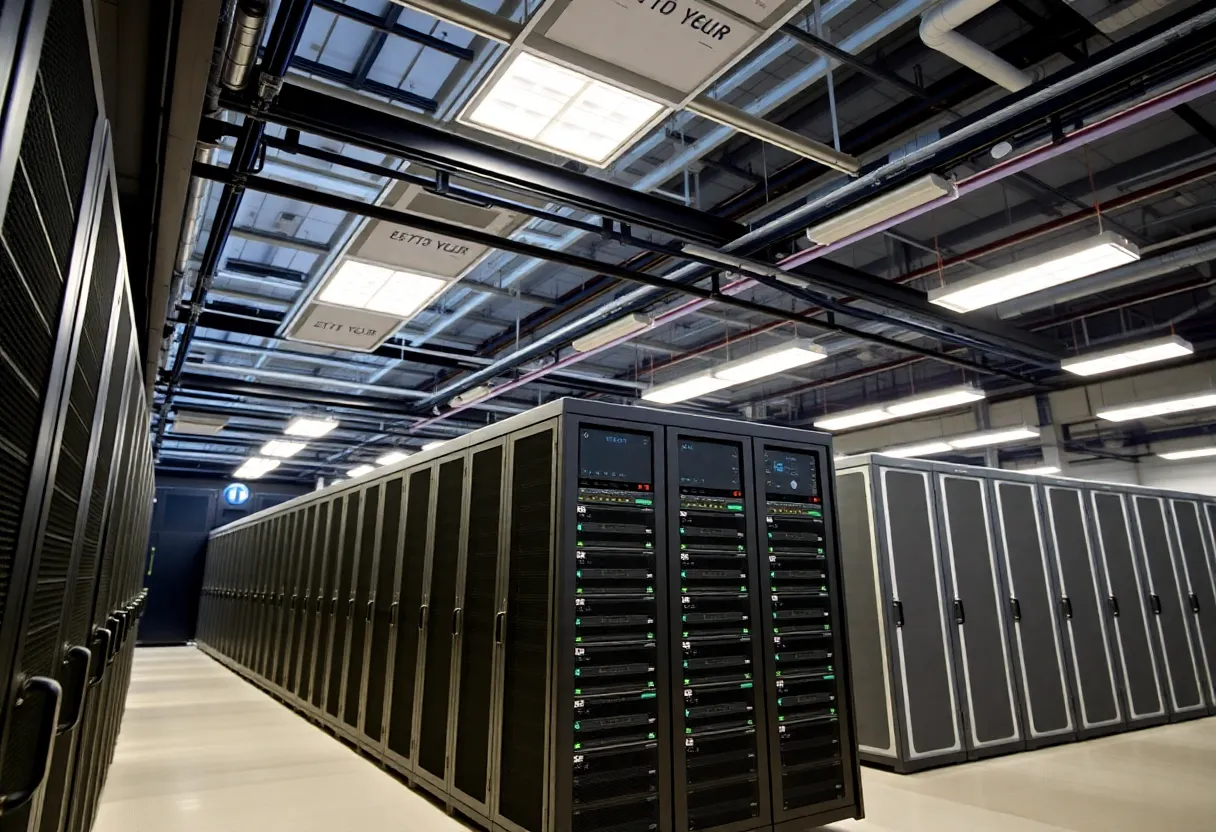Dallas, October 11, 2025
News Summary
The Dallas-Fort Worth area is rapidly expanding as a key data center market, with significant investments boosting its capacity for AI development. A new $1 billion ‘GigaPop’ campus is being built, and existing facilities are increasing their output to meet growing demand. Texas’s favorable conditions, including affordable land and tax exemptions, attract hyperscale cloud providers and contribute over $1.6 billion in tax revenue. However, this growth raises concerns regarding electricity and water resources, demanding sustainable solutions.
Dallas — North Texas ranks as the nation’s second-largest data center market, trailing only Northern Virginia. The Dallas–Fort Worth region has become a vital hub for AI development, and a major new campus and several large investments are expanding the region’s computing capacity and economic footprint.
Key developments and scale
A $1 billion “GigaPop” data center campus is under construction outside Dallas, spanning 800,000 square feet and capable of carrying up to 540MW of power. DFW hosted 591 megawatts of data center inventory last year, making it the second-most in the nation after Northern Virginia. One megawatt can power about 200 Texas homes, indicating the massive energy requirements for modern AI operations.
DFW is experiencing record levels of capacity expansion in data centers, particularly in 2024. Recent investments from Google and others are adding to DFW’s data center footprint, with major projects underway in Midlothian, Red Oak, and Plano. Texas had a total of 279 data centers as of September 2023, with the majority located in Dallas-Fort Worth, and this number has risen to an estimated 388 data centers in Texas.
Why companies choose DFW
Texas offers advantages for high-density computing, including affordable land, abundant and cheap power, and tax exemptions on electricity and server purchases through the Texas Data Center Exemption. These policies and local conditions support large-scale buildouts and attract hyperscale cloud providers and AI compute operators.
DFW has a strong pipeline of tech talent, supported by local universities such as the University of Texas at Dallas and Southern Methodist University. The University of Texas at Dallas has a large Computer Science department and an Artificial Intelligence & Analytics Lab, bolstered by initiatives that attract technical and entrepreneurial talent. DFW retains its tech graduates due to affordability and promising career prospects. There is a rapidly growing venture capital and startup scene in DFW, with many companies making significant use of AI technologies.
Economic and infrastructure impact
Data centers in DFW are becoming critical components of the modern economy, housing the infrastructure needed for cloud and AI computing. Texas’s data centers contributed over $1.6 billion in tax revenue to state and local authorities. The average data center’s power demand is increasing, with some requiring between 700 and 800 megawatts; this is comparable to the energy needs of a medium-sized city.
Data centers are forecasted to consume a significant portion of the nation’s electricity by 2030, raising concerns about energy and water resource strain. Research projects at local universities are focused on reducing energy and water use in data centers, indicating a commitment to sustainable growth amidst rising demands. The rapid growth of AI and cloud services is tied to increasing technology adoption, with projections for data generation expected to double in the next five years.
Local industry context and capabilities
DFW’s culture supports a pragmatic approach to innovation, grounded in established local industries including aerospace, telecom, healthcare, and energy. That mix provides both customers and specialized engineering talent for AI and cloud projects. The region’s combination of physical infrastructure, academic research, and policy incentives has accelerated capacity expansion and positioned DFW as a national hub for high-density computing.
What this means for residents and policymakers
Large-scale data center growth brings jobs, tax revenue, and investment, but it also increases demand for electricity and water. Policymakers and utilities face decisions about grid upgrades, renewable sourcing, and water-efficiency standards to balance economic gains with long-term resource management. Local universities and private sector partners are already pursuing efficiency research to limit environmental impacts as capacity expands.
FAQ
How large is the Dallas–Fort Worth data center market?
North Texas ranks as the nation’s second-largest data center market, trailing only Northern Virginia.
What major new data center is under construction near Dallas?
A $1 billion “GigaPop” data center campus is under construction outside Dallas, spanning 800,000 square feet and capable of carrying up to 540MW of power.
How much data center capacity did DFW host last year?
DFW hosted 591 megawatts of data center inventory last year, making it the second-most in the nation after Northern Virginia.
How many data centers are in Texas?
Texas had a total of 279 data centers as of September 2023, with the majority located in Dallas-Fort Worth, and this number has risen to an estimated 388 data centers in Texas.
What are the energy implications of data center growth?
One megawatt can power about 200 Texas homes, indicating the massive energy requirements for modern AI operations.
What local advantages help DFW attract data centers?
Texas offers advantages for high-density computing, including affordable land, abundant and cheap power, and tax exemptions on electricity and server purchases through the Texas Data Center Exemption.
Are data centers affecting statewide revenues?
Texas’s data centers contributed over $1.6 billion in tax revenue to state and local authorities.
What is the projected power demand for some modern data centers?
The average data center’s power demand is increasing, with some requiring between 700 and 800 megawatts; this is comparable to the energy needs of a medium-sized city.
| Feature | Detail |
|---|---|
| Market ranking | North Texas ranks as the nation’s second-largest data center market, trailing only Northern Virginia. |
| Major project | A $1 billion “GigaPop” data center campus is under construction outside Dallas, spanning 800,000 square feet and capable of carrying up to 540MW of power. |
| Regional capacity (last year) | DFW hosted 591 megawatts of data center inventory last year, making it the second-most in the nation after Northern Virginia. |
| State data center count | Texas had a total of 279 data centers as of September 2023, with the majority located in Dallas-Fort Worth, and this number has risen to an estimated 388 data centers in Texas. |
| Energy reference | One megawatt can power about 200 Texas homes, indicating the massive energy requirements for modern AI operations. |
| Tax & policy advantage | Texas offers advantages for high-density computing, including affordable land, abundant and cheap power, and tax exemptions on electricity and server purchases through the Texas Data Center Exemption. |
| Economic contribution | Texas’s data centers contributed over $1.6 billion in tax revenue to state and local authorities. |
| Large power demands | The average data center’s power demand is increasing, with some requiring between 700 and 800 megawatts; this is comparable to the energy needs of a medium-sized city. |
Deeper Dive: News & Info About This Topic
HERE Resources
Texas Businesses Urged to Brace for Storm Season
Dallas-Fort Worth Economic Outlook Shines Bright
Today’s Golfer Unveils Largest Golf Ball Test of 2025
Dallas Commercial Real Estate Sees Surge in Leasing Activity
Texas City Sparks Data Center Explosion
Texas Business Executives Express Concerns Over Inflation and Policies
Independent Bookstores in Texas Experience Growth Amid Market Challenges
AT&T’s Future in Downtown Dallas Remains Uncertain
Texas Stock Exchange Approved as National Securities Exchange
Texas Manufacturing Week Celebrates Growth and Innovation
Additional Resources

Author: STAFF HERE DALLAS WRITER
The DALLAS STAFF WRITER represents the experienced team at HEREDallas.com, your go-to source for actionable local news and information in Dallas, Dallas County, and beyond. Specializing in "news you can use," we cover essential topics like product reviews for personal and business needs, local business directories, politics, real estate trends, neighborhood insights, and state news affecting the area—with deep expertise drawn from years of dedicated reporting and strong community input, including local press releases and business updates. We deliver top reporting on high-value events such as the State Fair of Texas, Deep Ellum Arts Festival, and Dallas International Film Festival. Our coverage extends to key organizations like the Dallas Regional Chamber and United Way of Metropolitan Dallas, plus leading businesses in telecommunications, aviation, and semiconductors that power the local economy such as AT&T, Southwest Airlines, and Texas Instruments. As part of the broader HERE network, including HEREAustinTX.com, HERECollegeStation.com, HEREHouston.com, and HERESanAntonio.com, we provide comprehensive, credible insights into Texas's dynamic landscape.





